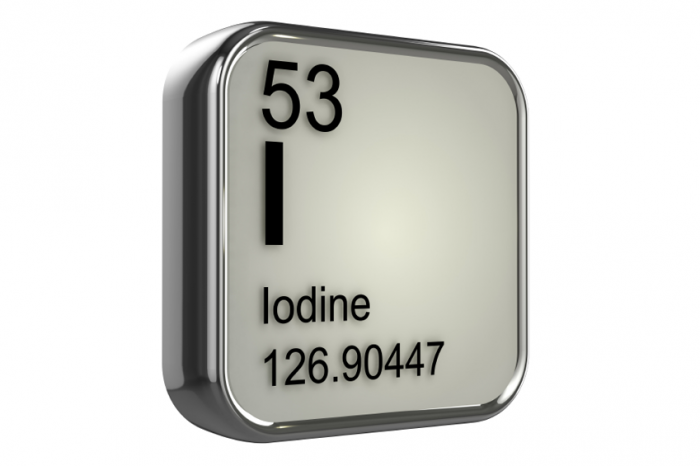Iodine is a trace mineral needed in the diet to maintain proper thyroid function and cell metabolism. Despite the practical elimination of iodine deficiency in Western nations after the introduction of iodized salt, an estimated 2 billion people worldwide remain at risk for iodine deficiency.
This article provides an in-depth look at recommended intake of iodine, its possible health benefits, foods high in iodine and any potential health risks of consuming iodine.
Recommended intake
The recommended intake of iodine for adults is 150 micrograms per day. Pregnant and lactating women have a higher need for iodine at 220-290 micrograms per day.

Iodine is needed in the diet to maintain proper thyroid function and cell metabolism.
More than 75% of the iodine in the body is stored in the thyroid gland.
Possible health benefits of consuming iodine
Low iodine intakes can cause goiter, a disorder of the thyroid gland that causes abnormal, visible swelling in the neck area. Goiter affects anywhere from 200-300 million people worldwide and is so common in some areas that the swollen gland is looked at as a normal physical feature.
Hypothyroidism is another potential consequence of low iodine intake, causing symptoms that include fatigue, weight gain, cold intolerance, and constipation.
Iodine deficiency in pregnant women can lead to many difficulties for the child, including mental deficiency, quadriplegia, deaf mutism, shortened stature and hypothyroidism.
In children, iodine deficiency can cause poor cognition and if left untreated, can lead to intellectual disability. Iodine deficiency is said to be the most preventable cause of brain damage or delay in the world.
Foods sources of iodine
The amount of iodine in a food depends on the iodine supply in the soil where the food was grown or where the animal was raised. The iodine content of soil varies by region.

Seafood and saltwater fish are the best sources of iodine.
Seafood and saltwater fish are the best sources of iodine.
Foods that contain goitrogens can block the thyroid from absorbing iodine.
Cabbage, turnips, rapeseed, peanuts, cassava and sweet potatoes all naturally contain goitrogens, however cooking the food can easily inactivate goitrogens.
Iodized salt contains 400 micrograms of iodine per teaspoon. Sea salt also contains varying degrees of iodine.
- Haddock, 3 oz: 104-145 micrograms
- Bread, 1 slice: 35 micrograms
- Cottage cheese, 2%, ½ cup: 26-71 micrograms
- Shrimp, 3 oz: 21-37 micrograms
- Egg, 1 large: 18-26 micrograms
- Cheese, cheddar, 1 oz: 5-23 micrograms.
Potential health risks of consuming iodine
The Upper Level (UL) limit recommended for iodine is 1,100 micrograms per day for adults and 200-300 micrograms per day for children.
Excessive consumption of iodine can lead to thyroid dysfunction and goiter.
It is the total diet or overall eating pattern that is most important in disease prevention and achieving good health. It is better to eat a diet with a variety than to concentrate on individual nutrients as the key to good health.
References:
1.
Mahan, L. Kathleen and
Escott-Stump, Sylvia. Krause’s Food & Nutrition Therapy, 12th edition,
Saunders Elsevier, St. Louis, MS, Copyright 2008.
No comments:
Post a Comment